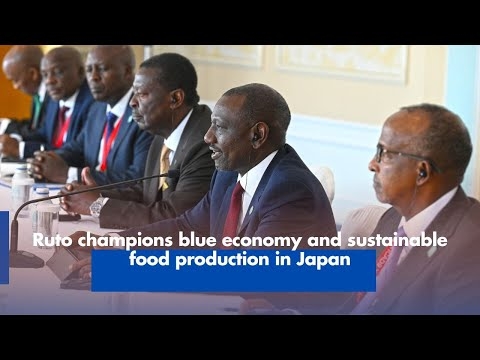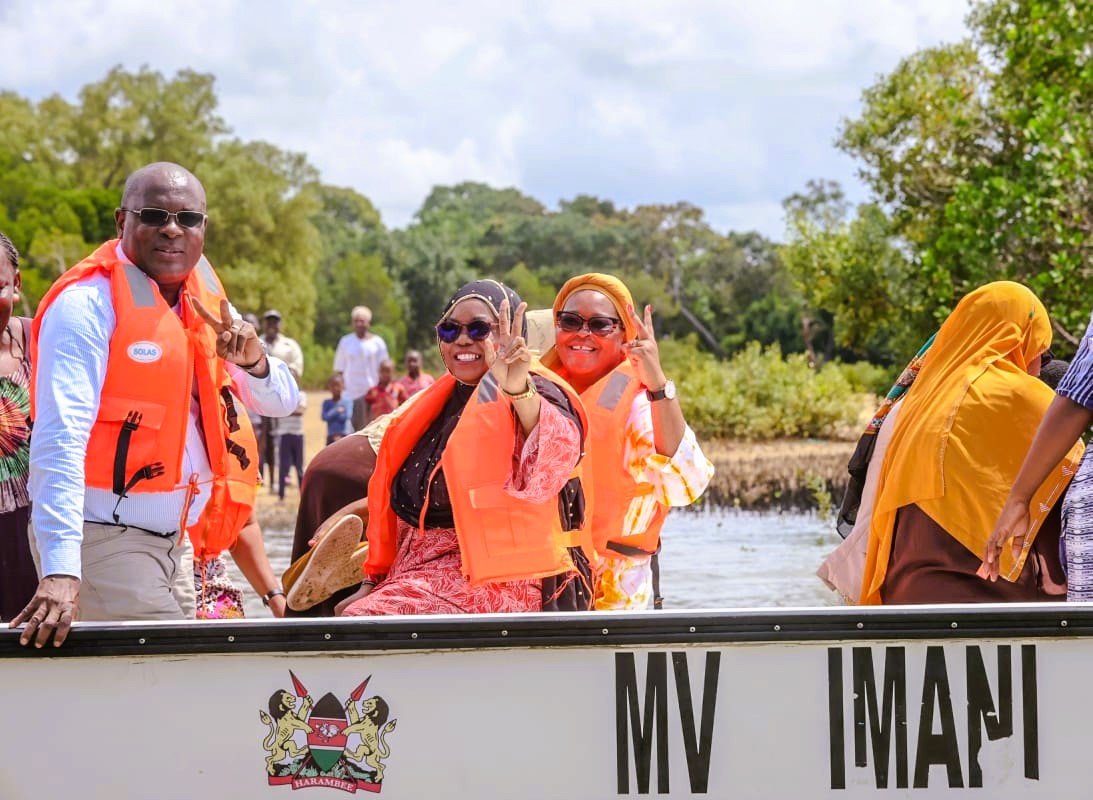

Coastal communities in Kwale are increasingly turning to the
fisheries sector to enhance their livelihoods, particularly through aquaculture
and improved fishing techniques.
This shift by artisanal fisherfolk in the coastal region is driven by the potential for sustainable food production, economic growth and improved food security.
The move is being supported by the county government in collaboration with the Kenya Marine Fisheries Socio-Economic Development (KEMFSED) project.
The KEMFSED project is implemented by the State Department for Blue Economy and Fisheries with funding support from the World Bank. The five-year project that has received Sh10 billion started from 2020 to 2025.
The fishery project is being implemented in Kwale, Mombasa, Kilifi and Lamu to enable artisanal and small-scale fishermen to increase catch. They are receiving modern fishing boats, fishing gears, safety equipment and post-harvesting handling tools.
The blue economy sector encompasses fisheries, maritime biotechnology, aquaculture, tourism and marine transport and logistics.
Governor Fatuma Achani said the KEMFSED project is making great strides towards building a climate-resilient aquatic food ecosystem.
Fishermen in Msambweni subcounty have received four fully equipped fiberglass motorised fishing boats through KEMFSED grants to enhance livelihoods for coastal communities.
Achani, who handed over the equipment, said the boats will enable the beneficiary groups to venture into offshore fishing, boost incomes and promote sportfishing.
The governor said the goal of the partnership with KEMFSED is to provide fishermen with the tools and resources needed to increase their catches, improve their safety and enhance their livelihoods.
“This is a major step forward in empowering our fishing communities with the tools needed including better boats, safety and fishing gear, to enhance their income,” she said.
"The county has issued at least 55 modern fishing and ecotourism boats, navigation equipment, fish finders, GPS among other fishing facilities to the fishery groups across the Kwale."
The coastal county boss has also issued value addition equipment including cold chain facilities such as freezers, chillers, cooler boxes, fish processing and vending equipment including modern energy saving jikos, frying pans, display boxes, solar lamps and umbrellas to several help groups and local beach management units (BMUs).
“This project aims at boosting the income of small and medium enterprises (SMEs) groups, which will further enhance their livelihoods,” Achani said.
Bodo BMU chairperson Swaleh Kondo expressed gratitude to the partnership project, saying the new boats and equipment will help them achieve better catch.
“For years, we have been struggling with old boats and unreliable fishing gear. These new modern boats with outboard engines will allow us to venture deeper into the ocean,” he said.
Kondo said the challenge traditional fishers face is the uncertainty of the catch due to depleting fish resources and increasing extreme weather events.
He said with motorised boats, fishermen can now undertake deep sea fishing beyond the limit of territorial waters, which is seven nautical miles from the shore, and within the Exclusive Economic Zone (EEZ) of 200 nautical miles from the shore.
Kenya's EEZ is a 200 nautical mile (370 km) area extending outwards from its coastline, granting the country sovereign rights over its resources such as fisheries, oil and gas and other seabed minerals within the zone.
Kondo, who comes from a long line of fishermen, said having access to outboard engines and improved fishing gear has allowed local fishermen to increase the amount of fish they catch.
He said modern fishing equipment, such as the deep-sea vessels, have allowed the fishermen to venture into the exclusive economic zone.
Governor Achani, who was accompanied by agriculture and fisheries executive Roman Shera and environment's Saumu Beja, later led a fish harvesting exercise in Mwazaro, Lunga subcounty, where 2,800 fingerlings are being reared by the Sunflower Women’s Group through the support of KEMFSED Project.
“This initiative is more than just aquaculture, it’s about economic empowerment, food security and giving our communities the tools to thrive,” she said.
Achani said the county has constructed 58 fishponds in Tsunza, Msambweni, Kinango and Lunga and stocked them with 70,000 fingerlings.
She said the devolved government will continue implementing projects that ensure food and nutrition security and enhance the livelihoods of residents.
“This initiative is not just about fish farming; it’s about economic empowerment. We are seeing real results on the ground, and today’s harvest is evidence that our people are embracing aquaculture as a source of income and nutrition,” Achani said.
Achani said the county is out to promote market linkages, reduce post-harvest losses, and raise the value of fish products by empowering women and youth with the right tools to thrive in the fisheries sector.
She said her administration is striving to modernise and expand aquaculture, making the subsector more independent and sustainable.
Mesalim Ali, chairperson of Maendeleo Bodo Self-help Group, praised the empowerment move terming it "a game changer".
“We’ve struggled for years without proper storage facilities or tools. Now, with these freezers and solar lamps, we can store fish safely and even operate in the evenings,” she said.
Mariam Masudi from Mkunguni Self-help Group said the initiative will help reduce waste and increase profits.
“Many times, fish would spoil due to lack of cold storage facilities, especially during power outages. With these coolers and chillers, we can now preserve fish longer and sell to more of our customers,” she said.
Alice Odhiambo, a member of the Sunflower Group, said the fish farming project has transformed their lives by generating income through the sale of fish.
"There was a time when we had no choice but to rely on others for everything-food, support, even basic needs. It wasn’t easy, constantly depending on other people and feeling helpless. But now, at least we can earn something of our own,” she said.
Magret Menza said pond fish will meet the community’s demand, especially when sea fish become scarce due to changing oceanic conditions.
Stakeholders say fish populations decline with changing oceanic conditions throughout the year, a phenomenon often linked to seasonal shifts in temperature, currents and food availability.
They contend these seasonal changes can affect fish distribution, reproduction and overall abundance, impacting fisheries and ecosystems.
Agriculture executive Shera said the empowerment drive has allowed the fishermen to store their catch for longer periods, reducing waste and boosting profitability.
He said the cold storage equipment has allowed fishermen to supply fresh fish, which sells for a higher price than dried fish to external marine fisheries markets.
Shera said issuing modern fishing vessels with enhanced operational range and carrying capacity, increasing cold storage capacity and enhancing processing facilities are crucial steps to improving the quality and efficiency of fisheries production.
“By implementing these measures, we can optimise our fisheries potential and support the welfare of the local fishermen,” he said.
Shera said the success of the project has brought renewed optimism to Kwale’s coastal communities, equipping them with the tools and knowledge to compete in today’s fast-evolving fishing industry.
He said Kwale and KEMFSED have been actively distributing modern fishing vessels to fisherfolk as part of a broader effort to improve the industry.

















